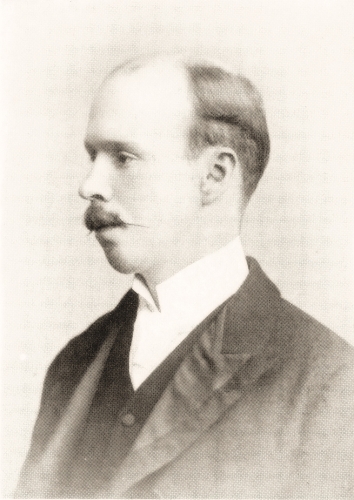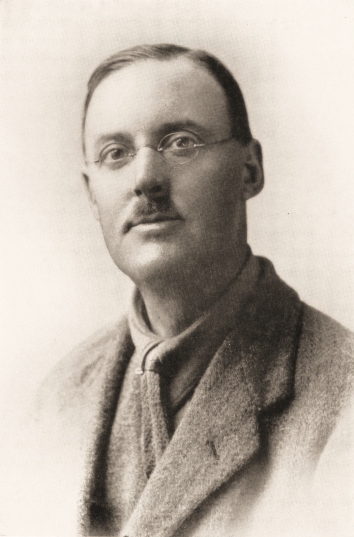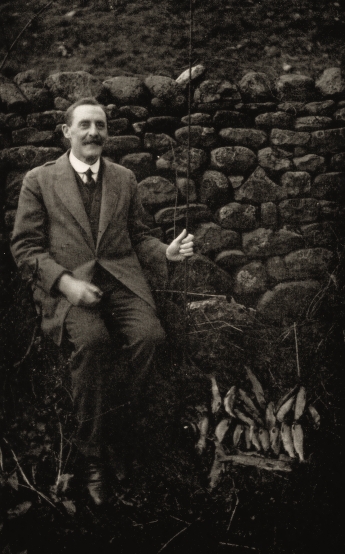In Memoriam
Claude Ernest Benson
As a literary man by profession Claude Benson seemed to us one of those fortunate people whose work led them to the mountain country. He became widely known by the publication in 1902 of CragandHoundinLakeland, a happy mixture of information and humour which charmed even those to whom fell and crag climbing and fox-hunting made no appeal, His last book, published some years ago, was MountaineeringVentures, delightful accounts of great climbs little known to the general public, an amazing effort for one who had never climbed abroad.
Benson was at Harrow and had been a First Division Civil Servant, but left the War Office for writing. He contributed any number of articles and stories to the Cornhill,Windsor, etc., wrote BritishMountaineering,ThisFairOutcast,andMilesRitson, and did much guide book work.
He became a member of our Club in I905, was on the Committee 1912-15 and Vice-President, 1927-29. A number of articles and verses from his pen have appeared in the Journal, vivified by his quite unusual powers of whimsical expression, which testify to his exceptional and exact knowledge of the mountains of Great Britain. He practically rewrote Ward Lock’s Guide to the Lake District, and his painstaking and accurate work made their Guides to Oxford and Cambridge a conspicuous success ; the excellent revision and additions to the Thorough Guide to the Lake District after Mr. Baddeley’s death are also his work.
Benson was a deeply religious man, actively connected with altruistic organisations in Harrogate, a man of wide sympathies, never happier than in the company of men interested in outdoor sport ; his enthusiastic love of the hills and the recollection of his cheery and amusing companionship will remain his enduring memorial. He died 30th March, 1932, and his widow, also a great lover of the hills, has followed him within the year. Books bought for the library in pursuance of a bequest in his will have been suitably inscribed.
James Henry Buckley
On 25th April, 1932, the Club lost a staunch supporter, and many of us an old personal friend, by the death of “ Harry ” Buckley.
From the day of his election in 1901 to the day of his death, the Club, its members, its activities, held a prominent place in his thoughts and affections. He was Vice-President, 1911-13, but for 20 years he was Librarian, putting in much work on the Journal, and continuing to the very last proofreading of the most vigilant and critical kind. He seldom missed a Club Meet, and to the Club he left a bequest.
Cycling, walking, climbing, pot-holing, fishing, sailing, followed in accordance with his bodily strength, all contributed to his pleasure. It seemed that every hill and dale and moor of Yorkshire, and every county from the Orkneys to Penzance was known to him, and varied experiences gained while exploring them stored his memory. Whilst Harry was a man of few words he could relate his experiences in a way which made him a delightful and cheerful companion.
Those of us who had his companionship years ago, on long days of tramping, and who after a good meal in caravan or tent, have sat and talked with him under brilliant starlit skies, will not easily forget how the serious side of his character often showed itself and how he would root out an old Bible and read in sonorous tones passages which confirmed a statement or supported a contention.
In later years we recall him as Master of the Ceremonies, and as C-in-C of many a Gaping Ghyll camp. These are pleasant memories, the wise word of advice to the chairman, the man at the telephone through many a long day, undertaking trouble and work that the Yorkshire Ramblers might do their job below, In his day Buckley claimed at least one fine expedition, Short Drop to Gavel Pot in 1898, and began his Gaping Ghyll descents with 1903, the first after 1896.
Happiest of all, I see him conducting at each Dinner, “ Ilkla Moor,” back and back into the days when the song was almost unknown.
He has gone from us, but by those who valued his friendship, and by those who received his generous help and assistance, his memory will long be retained and treasured.
Samuel Wells Cuttriss
Sam Cuttriss joined the Club in the year of its formation and was the first to treat cave and pot-hole explorations from the scientific point of view, and to make permanent records by photograph and plan.
But long before that he had been very active, had done what was possible in exploring caves, and was a very keen cyclist, even a C.T.C. Consul, riding in Norway for instance, which later he crossed on ski. Cuttriss and his little green bag of apparatus were prominent in all the great achievements of the first wave of pot-holers, and his companions recalled with amusement the great discussion which had raged, as to whether a mere cyclist should be elected.
He was a keen geologist, wrote several papers for the Yorkshire Geological and the Leeds Geological Societies, and was a member of the Underground Waters Committee. His Notes on Cowes have been collected and bound for the Library. Some of his MS. material is in the Editor’s possession, but unfortunately few of his plans have survived.
By profession he was an engineer and produced the first electric motor made in Leeds. In all the Club’s work he was very active till about 1908, when, on gold-mining affairs. he spent twelve months in the wilder parts of Northern Russia and Siberia, of which he wrote in this Journal.
Cuttriss was always cheerful, never tiring, at all times ready to take his share of hardships, and a thoroughly good friend. By his passing, 25th April, 1932, the same day as Buckley, the Club has lost a great and loyal member.
Edward Andrews
By the death of Edward Andrews, towards the end of 1932, the Club has lost an honoured member whose name appears in the very first list. For many years he had not associated himself with our activities, but he stood faithfully by the Club.
His old friends remember him with affection, and his presence will be missed at our annual social gathering.
Lewis Moore
By the death of Lewis Moore the Yorkshire Ramblers’ Club loses one of its earliest members and one of its most devoted supporters—in fact it may be truthfully said that the Club owes much of its success to his steadying influence, to his sage counsel, and to the unstinted and valuable service he gave to its development in the early years of its history.
His name appears in the first list of members, and as Vice-President in the second year ; for many years he served as Secretary, and was prominently associated with the first Annual Dinners of the Club. In the arrangements for these no detail escaped his notice and no trouble was too great to ensure that the Club’s personal guests had their wishes and their comfort anticipated. But it was in the conduct of the committee meetings that he was at his best. His clear methodical mind, his business acumen, and, above all, his genial humour and his ever ready wit frequently saved a situation when difference of opinion might have developed into personal feeling,
In 1909 he was—to the delight of all the members—elected President of the Club, a position he filled for three years with credit to himself and honour to the Club.
Moore was a man with a high sense of social and civic responsibility. ln earlier life he gave much of his time and energy in the development of the Market District Boys’ Club, and after the War took on municipal responsibility to the great advantage of the Community. As Chairman of the Leeds Watch Committee he was a conspicuous success, and it is safe to say that but for his unfortunate breakdown in health he would have attained the highest of civic honours.
It is for this sad reason that to the youngest members of the Club Moore was, to their misfortune, little more than a name; but to all others he was a very lovable character, with a keen sense of humour—as is evidenced by his contribution to the Club Journal under the pen-name of “A Silent Member ”—a very ready wit, a delightfully even temperament, and a remarkable capacity for making and maintaining friendships. Of him it may be truly said that he never made an enemy and never lost a friend.
Many of us will long cherish the memory of one who was such a cheerful companion either on a fell walk, a mountaineering or a pot-holing expedition. One of the few men who knew the hills of Ireland, his article on “ The Ancient Kingdom of Mourne ” should be read.
The Yorkshire Ramblers’ Club, and in a wider sphere, public life in Leeds, are poorer by his death.



